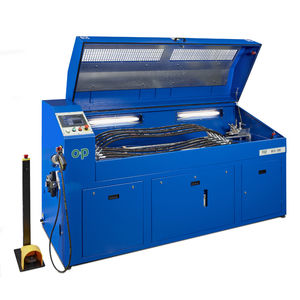Where to buy pressure test benches in Nigeria
Here is the audio of this Article
Hydraulic power control systems such as pressure test benches are essential to the mechanical systems applicable in every automotive and mechanical field to test a vessel's reliability and ascertain pressure ratings. The Pressure test benches are used to test parts of the equipment vessel for strength and leaks before use. A pressure test bench for industrial equipment such as the pipes, hoses, cylinders, and other materials is used to contain products in gaseous and liquid phases ensures your pressure vessel's proper operation and safety; contact GZ Industrial supplies for more inquiries on the available pressure test benches.
What is pressure test equipment?
These are equipment used for Pressure testing or hydrostatic testing, carried out after the installation of any pipeline before it is put into use. The pressure testing aims to investigate the pipeline's various limits, which will test areas such as reliability, maximum capacity, leaks, joint fittings, and Pressure.
An example of pressure test equipment is the pressure test bench which uses Oil, water, or gas for testing. Most equipment and appliances, both at home and in the factories, work with mechanical systems controlled by Pressure and have proven to be a valuable tool in illustrating the functionality of Pressure reducing and directional control valves.
The proper Pressure used for Testing a Pressure Vessel
A pressure test is required for a new pressure system before use or an existing one after repair or alteration, achieved using the pressure test benches. When it comes to gauging Pressure, you should always err on the side of caution by ensuring the amount of Pressure placed on the vessel is considerably higher than the normal operating levels. This will help ensure that your vessel doesn't experience any issues during operation.
The range should be 1.5 and 4 of the pressure test value. This will ensure that the vessel can handle any spikes in pressure during its operation.
Why pressure testing is Important
A pressure testing bench can help your company test new components and sub-assemblies before installation. This can shorten troubleshooting time and take the guesswork out of the diagnoses. When designing a hydraulic power system, it's important to consider various factors, including power, Pressure, flow rates, and the circuitry mechanism. By considering all these factors, you can ensure that your hydraulic system is effective and efficient.
The components of a hydraulic system, such as pumps, electric motors, reservoirs, working fluid properties, hydraulic circuitry, and valves, work together to create a functional unit. Each element plays an essential role in the system's overall performance.
Buy from our online store Pressure Test Bench
Where to Buy Pressure Test Benches in Nigeria
Here are some of the notable locations across Nigeria where you can get reliable Pressure test benches
GZ Industrial Supplies
Gz Industrial supplies is a distributor and supplier of hydraulic and pressure testing machines in Nigeria.
Sango Ota
GZ Industrial Supplies
Km 42 Lagos-Abeokuta Expressway,
Opposite Coronation Power and Gas Limited, Ado-Odo/Ota, Ogun State
Contacts Tell. +234 8053390168
Ogba
GZ Industrial Supplies Nigeria Ogba
77/79 Yaya Abatan By College Road Ogba Lagos State
Contacts Tell. +234 8181069339, +234 9055793557
WhatsApp: +234 9055793557 +234 8181069339
Calabar
30/32 Ndidem Usang Iso Road. Mariam Calabar 540242
Calabar
08053098754
Port Harcourt
GZ Industrial supplies Nigeria
238 Aba Road, by Fidelity Bank Rumuogba
08053390163.
Tikweld Welding Supplies and services
Tikweld welding supplies and services is a distributor and supplier of industrial products such as the pressure test benches in Nigeria.
Port Harcourt
238 Aba Road Rumuogba
First floor Onyejieke Plaza
08053390129
Lagos
Suit 10 Pine plaza
Suit 10 Olive Plaza Formerly Sebuf plaza Lekki Epe Expressway Lekki, 105102, By Osopa London. Lagos
Abuja
Shop 016, Zitel Plaza, Plot 227 P.O.W. Mafemi Cres, Utako 900108, Abuja
Call us 24 hours +234 90 557 935 58
Uses of the pressure test bench
1.Testing the hydraulic components with a pressure test bench helps identify problems by testing all rebuilt parts, which guarantees proper operation and ensures customer satisfaction.
2. The use of pressure test benches carefully ''break-in '' components such as pumps and motors that have rotating parts with clean filtered hydraulic fluids to rebuild pumps and motors to have a long service life.
3.It aids the company in preventing warranty claims and supports customers in solving hydraulic system problems.
4.This performance testing method tests rebuilt hydraulic components to ensure proper operation before they are reinstalled on equipment. Doing this prevents additional and expensive production equipment downtime.
5. It's important to check used components before removing them from production equipment using the pressure test benches; by doing so, you can ensure that the parts are still functional and eliminate the need for unnecessary repairs. In many cases, the only thing a component needs to be up and running again is a cheap shaft seal or housing O-ring.
6. By performance testing your components, you can ensure that your company receives quality parts and avoid costly downtime for additional production equipment.
7. System equipment testing would be made much easier if new equipment, from pumps to end components like compressors and transfer pumps, both pneumatics, hydraulic, and cranes with remote mounting, could be tested without having to use a truck chassis. This would allow for a complete evaluation of the equipment and potentially prevent issues further down the line.
8. The system is designed to store different drums of fluids at different viscosities and temperatures. This allows for a more accurate simulation when testing products.
Components that require the need for a pressure test bench
1. PUMPS
They are driven by the variable speed bi-directional hydraulic motor on the test bench. Pumps are mounted on the universal mounting bracket supplied with the bench. The physical connection between the test pump and bench motor is accomplished with a universal driveshaft and adapters between the drive shaft and test pump shaft. The test pump receives Oil from the bench reservoir. Discharge flow from the test pump is measured by a flow meter and restricted by a load valve before discharge flow is returned to the bench reservoir. Pumps are checked for efficiency at rated working pressure and external leaks. The standard test bench tests only one pressure port at a time. We are adding a second pressure port to use a tandem pump arrangement.
2. MOTORS
Motors are driven by the variable volume hydraulic pump on the test bench. The test motor drives the hydraulic motor on the bench (therefore, we are using the test bench motor as a pump). Mounting the test motor and the physical connection between the test motor and the bench motor is the same as described in the "pump test" above. The discharge flow of the bench motor is restricted with a load valve, thereby putting the test motor under a workload. Motors are checked for efficiency at rated working pressure and external leaks.
3. CYLINDERS
Cylinders are pressurized and operated by the variable volume hydraulic pump on the test bench. Flow is directed to and from the cylinder by a manual-operated four-way valve. Cylinders are checked for scored cylinder bores, worn piston packing, and external leaks.
4. RELIEF VALVES
Relief valves are pressurized and operated by the variable volume hydraulic pump on the test bench. Relief valves are checked for internal leakage, external leakage, "cracking" Pressure, pressure setting, and resetting Pressure. The bench can measure flow returning from the valve to the bench.
5. FOUR-WAY VALVES and VALVE BANKS
Four-way valves and valve banks are pressurized by the variable volume hydraulic pump on the test bench. Generally, the valve spool is shifted to direct oil to a blocked valve port, and leakage past the spool is visually checked at the non-pressurized adjoining port. Valves are checked for external leaks.
Conclusion
The need for a pressure test bench is important for every domestic and industrial environment. It Solves the problem of identifying leakage on pipes, hoses, cylinders, and other materials used to contain products in gaseous and liquid phases as it ensures your pressure vessel's proper operation and safety. Contact GZ Industrial Supplies for further enquiries.








